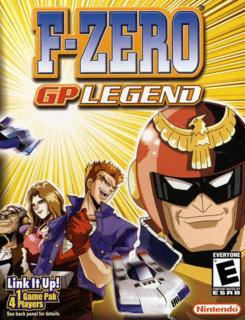F-Zero's transition to the new style comes at the expense of gameplay, but not content or production values.
Most of the aspects of racing have change. First off, there are no lap requirements at any point of the game. You are allowed even to finish 30th and still advance. However, the big difference comes at the inclusion of a point system after each race. While the change itself isn't a bad thing, it brings the challenge level lower, for you can still finish 5th or 8th on the last race and still win 1st. It's apparent that this change was meant to reflect the change in the console counterparts, but it never really feels needed, especially when the old formula worked fine. Some, however, may appreciate the change.
Gone, also, are the dummy racers and instead all 30 racers are now viable contenders- each with their own unique craft. This is an incredible achievement on the GBA's hardware, considering just how many ships that is. Although they never appear clustered together as they do in the console counterparts, they do seem to have substance to them, whether you're 2nd or 11th, they feel like real contenders, rather than just dummy cars. Unfortunately, this takes away from the rush of being in 1st and dodging these slower racers. Again, some who were annoyed may see this change for the better.
There are a variety of other changes as well, for now boost takes away from the power meter, and you can boost multiple times in a lap as long as your car can handle it without running out of power. This isn't necessarily a bad change, either, as it puts more influence on actual speed than racing as well as conservation, but since racing badly slows you down, it makes for a more interesting experience. In addition, each of the 30 vehicles in the game take into account boost power, so this is also a key aspect of the game. The vehicles bounce a little too much off the sides of the track, and anyone who isn't used to the way it plays will laterally bounce around for a few races until they get the right feel and learn to use them to an advantage. Purists of the racing the best one possible can will be disappointed here, as the computers use tactics of bouncing around as well.
The biggest change, (and understandable, considering the move to the children's TV show style) comes in the form of difficulty. If you've mastered the original games, then you might as well skip this iteration, as it's possible to win every single match you ever race. There is no challenge to the experienced whatsoever, except maybe in the dull licensed tests. The A.I. has been dumbed down forcibly, and the game is still a breeze even on expert difficulty.
With all this holding GP Legend back, what makes it a worthwhile purchase? For those looking for easy racing games accessible to all ages, this is a good buy. The one benefit those who are seeking a quick F-Zero fix will find it in terms of the enormous amount of content here. There are 4 leagues (1 of which features 8 tracks from the original SNES game) and 3 of them completely change on the last difficulty setting, creating even more variations. Not to mention the inclusion of a lengthy story mode that provides to be the best way to spend your time in GP Legend.
One of the changes in the gameplay style that feels a bit better given the circumstances are the tracks. Now they are built with more jumps, speed boosts, and an overall flair to them that helps distinguish one track from the other. The inclusion of story mode and the original locations from the SNES game give the game back much of its character that had been lost in the previous game's style.
The graphics are just as amazing, and now different tracks have different depths to them, as Mute City feels much higher above cityscape, than say, Big Blue, which hugs the ocean surface. This, including the backgrounds and all the different vehicles on the track push the GBA beyond what's expected of the system. It's just a wonder when they'll be able to do multiple heights on tracks.
The sound is at it’s best and a clear improvement over the predecessor in terms of music and even the depth of the actualy sound effects themselves. Boosts sound much deeper as well as crashes. Back are all the old tunes, and some fantastic new ones at that. The credit scroll to the game features a full length and epic sounding rock song that feels true to the F-Zero universe, and everything in terms of style and substance falls completely together to create a racing that that, even though a bit of a step down, gets some things right.
It's only a shame that they seemed to have made the game so much easier. Maybe that can be understandable considering a new Saturday morning audience, but it comes at the expense of the fans of the series.

